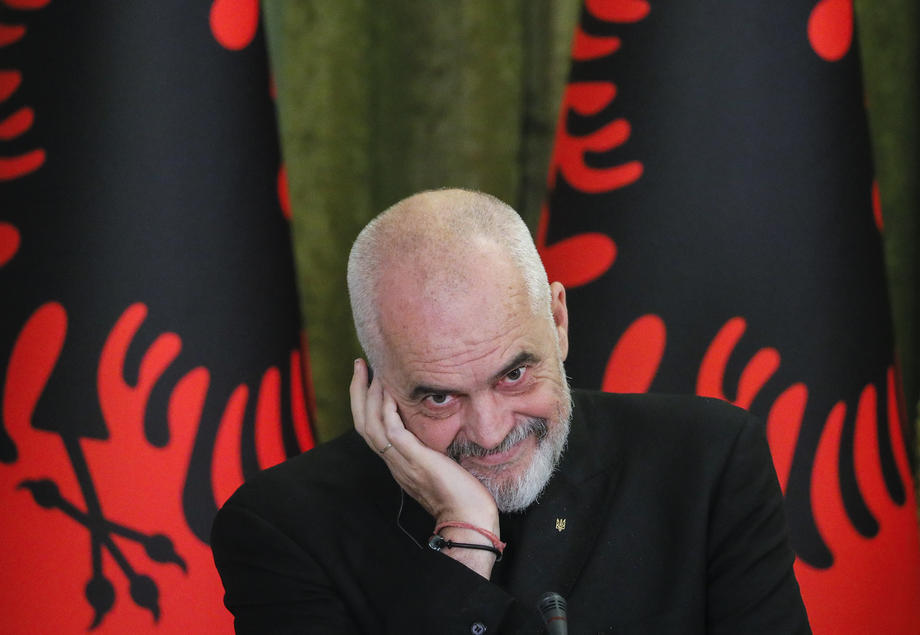"Albania is no longer a bad Balkan joke" | "The Economist": Rama Prime Minister until 2029

For a long time, the darkest and most controversial part of Europe, the Balkans, may have a new leading light. The most unusual is the prime minister of Albania, former basketball player and 58-year-old modern artist, Edi Rama, writes The Economist.
Last month, his Socialist Party won almost all but a handful of the country's 61 mayors and councilors.
He is likely to win the next general election, scheduled for 2025, his fourth consecutive victory, and thus rule until 2029 in what was once the region's poorest seat.
In power since 2013, Rama is now the longest serving head of government in the Balkans.
In 2000, he emerged as the dynamic and colorful mayor of Albania's capital, Tirana. He has been leading his party since 2005.
Now he can claim to be a "Balkan star", even a calming influence in a still-fragile region: witness the strife in neighboring Kosovo, where the Serb minority has been pitted against the ethnic Albanian majority.
Mr. Rama asks the West to treat Serbian President Aleksandar Vucic sensitively.
Sitting in his office after returning from talks with Manchester City Football Club about setting up a network of training academies in the Balkans, he cuts an imposing figure in a T-shirt, trousers and shiny trainers.
He is a physically tall, stocky prime minister with a neatly trimmed white beard, watchful eyes.
Fluent in a wide range of languages, he is undeniably cosmopolitan, despite growing up in what was once one of the world's most isolated, wild and paranoid countries, which today's Albanians often refer to as the "Korea of Europe's North".
"Italy was our America. Television, Italian football, the Pope, music. TV viewership was not easy," emphasizes Rama.
He remembers covering his room with sheets and carpets so no one could hear him and his friends playing forbidden Beatles songs.
He says he remembers his shock and delight when he was able to read Kafka, Proust and Dostoyevsky, listen to Ravel, Debussy and Stravinsky and see paintings by Cézanne, Van Gogh and Picasso.
His critics note that he was a child of communist nomenclature; his father was actually a prominent official sculptor who may have modeled Stalin's features.
Mr. Rama is also accused of cult of personality. One Western observer calls him "brilliant, visionary, eccentric, egomaniacal…with a strong sense of his legacy in history."
He is not ashamed to list his achievements or at least those of post-communist Albania. Tirana is unrecognizable from what it was three decades ago: a dark, gray, totalitarian, sub-Soviet, Ruritan city.
At that time the entire country had about 6.000 cars – it was illegal to own one privately. Now there are more than 700.000. Although Rama's party is descended from the one led by "mass murderer" Enver Hoxha for 44 years until his death in 1985, it has been completely rebuilt into a social democratic, pro-market group.
His critics accuse him of entrenching corruption under an oligarchic elite that dominates the media and allowed inequality to grow.
Mr. Rama rejects such claims. He says he models his party after Tony Blair's Labour.
In fact, Tony Blair, his wife Sherry and his long-time adviser Alastair Campbell still come to see him for advice.
"We are not very ideological. For us there is no right or left solution: it is not heresy to have a right solution that works. "Margaret Thatcher was a great leader who made painful reforms to modernize Britain, without which New Labor would not have succeeded," he stressed.
Mr. Rama's faith extends to almost the entire region.
"The entire Balkans, even the traditionally pro-Russian Serbia, are united behind Ukraine. A member of NATO since 2009 and part of the Schengen group since 2010, which guarantees visa-free travel in Europe for up to three months, Albania has no serious problems with its neighbors. This is unique in our history," emphasizes the Prime Minister.
As for actual EU membership, he wisely refuses to set a date, while accepting the Union's demands to push reforms on Albania itself.
Rama admits that several EU countries, led by France, are wary of letting the Balkans go. The opinion of every Western diplomat in Tirana is that Albania is "going in the right direction" but that it "still has a long way to go", especially in terms of rehabilitating the courts and creating a real rule of law... an issue to which the EU and America are devoting much attention attention and money.
A vetting scheme for the country's entire body of judges and prosecutors led to the dismissal of two-thirds of them. What happens to those who are eliminated?" "They become lawyers and accountants," points out a local civic activist.
Endemic corruption is still the biggest blow in Albania today. The two main parties are responsible, in the eyes of the majority of Albanians.
The other big issue that worries Mr. Rama is immigration. The population has shrunk by at least a quarter since the end of communism, to about 2,9 million today. Albanians continue to leave.
Mr Rama was understandably nervous when asked about the common perception in the West that many Albanians, including those who arrive in Britain illegally by sea, are involved in crime.
But his most serious complaint is the continued lack of civility in his country's politics. All sides denounce each other as "gangsters", "crooks", even "murderers", which in some cases is true.
"This dates back to the horrifying times of Hoxha, when the slightest dissent often meant exile, imprisonment, even execution." If Albania is to become a liberal democracy, this must change. If this happens, it will be my greatest legacy," he emphasizes.
According to him "maybe it will take another generation"


